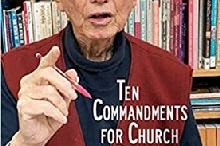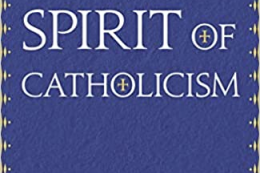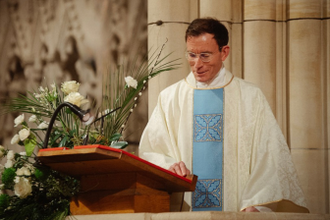Book: Journey Into Light by Roderick Strange

Journey Into Light by Roderick Strange. Publisher: Hodden & Stoughton, 2021, £16.99
Monsignor Strange, Rector of Mater Ecclesiae College, Twickenham, subtitles his book, 'The Challenge and Enchantment of Catholic Christianity.' One could be put off by the insertion of the word 'Catholic' as being somewhat sectarian. Whatever one's feelings about that, what Mgr Strange attempts is to recall to Catholics the spiritual wealth and religious beauty of their faith.
Many have left the Church, especially young people. And even those who retain their membership are not always in accord with all the Church teaches. Back in 1995, then Cardinal Ratzinger reminded Catholics that if they were not in agreement with the teaching of John Paul II that women were definitively barred from priestly ordination, they were not in full communion with the Church.
In any event Mgr Strange writes to all Catholics to walk once again the challenging journey through the Church's year, season by season. He is a competent, articulate guide to the possibilities of a more challenging experience of the journey of faith.
He begins by talking about God as a person. He avails of the thought of the late Herbert McCabe, OP who spoke of God as a person, but not a person as we think of person. Person is an image and therefore misleading. We need the image to be able to engage with God, just as you and I might use the image of Gaia to personify a planet in peril. Ultimately, God as person is mystery, beyond our understanding. We are invited to look upon the mystery of a God who looks upon us, who breathes upon us, with a steadfast lovingkindness.
The journey our author leads us upon begins in Advent, four Sundays in which our desire for a new coming of the Lord is expressed and celebrated. John the Baptist and Mary will be the principal guides to the mysteries of Advent.
John the Baptist bursts on the scene wielding an axe to the root of the tree of Israel. Unless the people change their ways, the axe will finally fell them. He is a threatening figure, in stark contrast with Jesus whose path John wants to clear. His message is a prophecy against injustice which in prophetic theology is an insult to the holiness of God.
Mary's role is different. She is a young girl fast becoming a woman of steel, yet with the softening which comes with maternity. Strange is not afraid of raising the question of the possibility of Mary's virginity, or sexual innocence. He makes no apology. He simply says that that is what the Church has always believed. Nevertheless, I would have liked him to explore Mary's virginity in the light of her Magnificat: her virginity as an instrument of God's power in history.
After Advent, Christmas. Our author explores the different accounts presented by Matthew and Luke. Both accounts centre on the birth of Jesus. There the similarity ends. For Matthew, Joseph plays an important role, one guided by his dreams. For Luke, Mary is the co-star, so to speak. Matthew quotes the Hebrew Scriptures to show how they are fulfilled in Jesus. Luke, on the other hand, has a wider vision, articulated by Simeon who calls the child, 'a light for revelation to the Gentiles'.
Mgr Strange continues on through the liturgical year with its different hues and facets, and helps us to bring Scripture to bear on our lives.
When he comes to Ordinary time after Pentecost he dedicates a chapter entitled, 'Reforming the Church'. He gives a very interesting account of the keys which helped the Bishops make of Vatican II a council of reform in line with creating a more engaged pastoral church for the life of the world. He gives a brief account of the different Popes' contribution to reform down to the present.
But all was not well. From the 1990s glaring incidents of the sexual abuse of children by priests came to light in the universal church. Strange calls it, "a devastating obstacle to the realizing of the Council's vision…." Trust has been lost. Clerical power has been abused.
In his book, 'The Ethics of Freedom', the French theologian Jacques Ellul wrote that all authority comes from God; all power comes from the devil. The church has lost its authority due to the diabolic exercise of power.
Our author laments what has happened. He admits that restoring trust will not be easy. It will be a long process. The Church's situation is desperate. He ends the chapter quoting Lamentations 3:17. "My soul is bereft of peace; I have forgotten what happiness is." Yet, "The steadfast love of the Lord never ceases" (Lamentations 3:21).
A blurb on the cover quotes Cardinal Vincent Nichols calling the book, "An eloquent Catholic apologia". For Catholics of my generation and before, apologetics meant the 'weaponizing' of scriptural texts to demolish the beliefs of other Christians. There is none of that in Mgr Strange's book. It is a pastoral, theological and spiritual reflection on the Church's liturgical year, enhanced by good stories and religious art. It is one to read reflectively, and one to give as a gift.


















